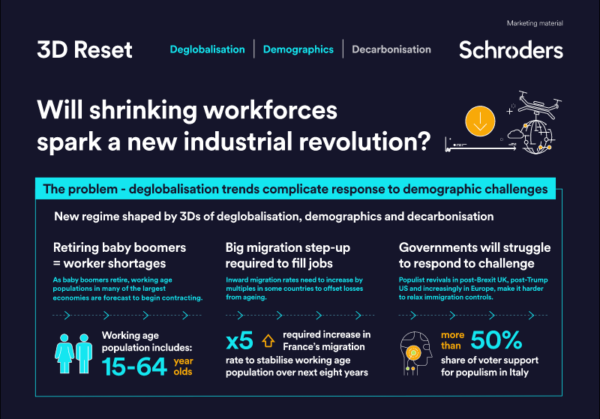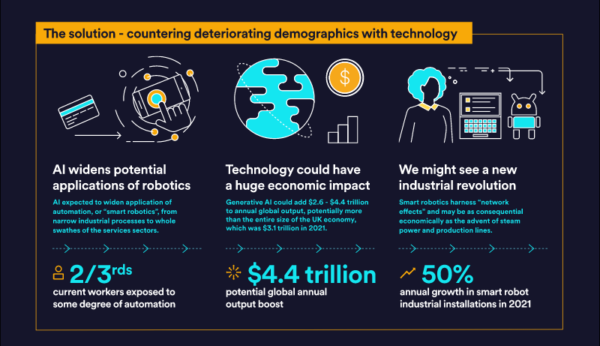Mar
2024
Infographic: will shrinking workforces spark a new industrial revolution?
DIY Investor
3 March 2024
Retiring baby boomers in many countries will mean fewer workers, forcing companies to turn to robotics, automation and AI, with many potential investment implications.
As baby boomers retire, the working age populations in many of the world’s largest economies is forecast to begin contracting.
The result will be fewer available workers, weighing on growth and exacerbating inflationary trends in the global economy.

How companies respond and the investment implications
How companies and policymakers, whether governments or central banks, respond to the 3D Reset will be crucial to understand.
Less supportive globalisation trends linked to rising protectionism, will limit the response to demographics through the relaxation of immigration controls, for instance.
Azad Zangana, Senior European Economist and Strategist, says:
“The rise of populist politics has meant that populations are less willing to allow migrants to come in and fill roles, so companies are having to think of alternative solutions to the labour shortages.
“The shortage of workers will force companies to begin to make greater use of robotics, automation and AI in order to manage their rising costs.”
There are many uncertainties around the investment implications, not least due to the speed of change.
Where previous industrial revolutions took decades to create large scale impact, AI-first companies are registering that impact in months.
But investors are seeing some clear “second-order” impacts from AI trends which are set to touch many industries.

Nils Rode, Chief Investment Officer, Schroders Capital, says:
“The AI revolution is driven by venture capital backed start-ups, so venture/growth capital is the place to be for investors who want to get direct exposure to this mega theme.
“Additionally, we expect the impacts of AI to have second-order impacts on the real estate and infrastructure markets.
“The substantial data processing requirements and the production of even more data through AI is giving a further boost to demand for data centres, creating tailwinds in this area.
“Furthermore, AI’s massive compute appetite needs substantial energy resources, that we see as an opportunity for infrastructure investments, particularly in renewable energy.”

Daniel McFetrich, Head of Global and International Equity Research, says:
“We are witnessing a multi-year transformation of factories, warehouses and industrial assets.
“This will revolutionise not just how we manufacture, but also how we distribute, design and monitor assets in the field.
“The increasingly quick paybacks on these investments, faster and more reliable communications networks, and ageing demographics all mean the desire and need to invest is accelerating now.”
To view the full infographic click here
Important information
This communication is marketing material. The views and opinions contained herein are those of the named author(s) on this page, and may not necessarily represent views expressed or reflected in other Schroders communications, strategies or funds.
This document is intended to be for information purposes only and it is not intended as promotional material in any respect. The material is not intended as an offer or solicitation for the purchase or sale of any financial instrument. The material is not intended to provide, and should not be relied on for, accounting, legal or tax advice, or investment recommendations. Information herein is believed to be reliable but Schroder Investment Management Ltd (Schroders) does not warrant its completeness or accuracy.
The data has been sourced by Schroders and should be independently verified before further publication or use. No responsibility can be accepted for error of fact or opinion. This does not exclude or restrict any duty or liability that Schroders has to its customers under the Financial Services and Markets Act 2000 (as amended from time to time) or any other regulatory system. Reliance should not be placed on the views and information in the document when taking individual investment and/or strategic decisions.
Past Performance is not a guide to future performance. The value of investments and the income from them may go down as well as up and investors may not get back the amounts originally invested. Exchange rate changes may cause the value of any overseas investments to rise or fall.
Any sectors, securities, regions or countries shown above are for illustrative purposes only and are not to be considered a recommendation to buy or sell.
The forecasts included should not be relied upon, are not guaranteed and are provided only as at the date of issue. Our forecasts are based on our own assumptions which may change. Forecasts and assumptions may be affected by external economic or other factors.
Issued by Schroder Unit Trusts Limited, 1 London Wall Place, London EC2Y 5AU. Registered Number 4191730 England. Authorised and regulated by the Financial Conduct Authority.

Leave a Reply
You must be logged in to post a comment.